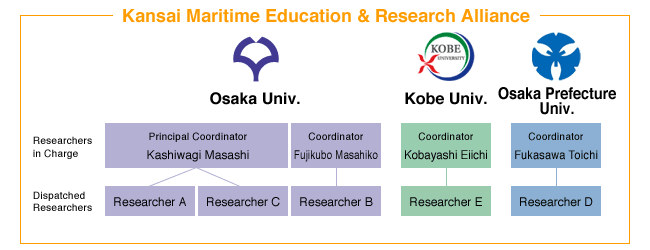Organization for Research
What is needed in the field of naval architecture and ocean engineering for the study to be focused and thereby the enhancement of academic level is the establishment of (1) numerical methods which enable us to analyze strongly nonlinear hydrodynamic phenomena such as the green-water impact in harsh stormy waves, and (2) dynamic analysis methods for genuine fluid-structure interactions, such as large deformation of a structure due to extreme wave loads and then the resulting change in hydrodynamic phenomena and wave loads.
These research themes are definitely challenging and not easy. However, once advanced numerical analysis methods are established, we can predict whether marine structures may collapse by harsh attack of tsunami and/or typhoon and take measures beforehand for prevention and reduction of natural disaster. If that is the case, the outcome of the project may provide not only academic progress but also social impact and contribution to our life.
The principal coordinator of this program, Prof. Kashiwagi of Osaka University, keeps a long-term relationship of strong mutual trust and cooperation with Prof. Ferrant of ECN in France and Prof. Faltinsen of NTNU in Norway. Thus he is in charge of setting up a plan of joint research with ECN and NTNU, executing that plan, coordinating the dispatch of younger researchers, and also reporting the progress and final results of the project.
The associate coordinator, Prof. Fujikubo of Osaka University, had stayed in NTNU for one year and is keeping in touch with Prof. Moan through collaboration and editorship of international journals. Thus he has a strong personal connection with Prof. Moan and hence he is in charge of arranging the research plan from a viewpoint of structural mechanics and supporting younger researchers. Prof. Kobayashi of Kobe University, who is another associate coordinator, is a representative of Kansai Maritime Education & Research Alliance and responsible for the setup and execution of the research theme on the prediction of behavior of ships in a harbor and the proposal of safe evacuation scenario in the event of tsunami and harsh storm. Furthermore Prof. Fukasawa of Osaka Prefecture University, who is also associate coordinator, has an experience of collaborating with Prof. Moan of NTNU on the research on nonlinear hydro-elastic behavior of ships, and thus he will arrange the research on large-scale analysis methods for fluid-structure interactions and support the research of younger researchers.
Organization for Execution and Support of Project
The brain circulation project supported by JSPS is regarded as “Project for Nurturing Young Researchers of Next Generation” within the framework of Kansai Maritime Education & Research Alliance, and thus common support will be provided to all younger researchers recommended from the member universities of Kansai Maritime Education & Research Alliance, irrespective of which university they are from. The steering committee consists of all members coordinating this project, and will discuss the plan of international collaboration, confirm the progress, provide necessary information to younger researchers, arrange international seminars and academic meetings, and so forth.
What’s Kansai Maritime Education & Research Alliance?
Osaka University, Kobe University, and Osaka Prefecture University exchanged an inclusive cooperation agreement in October of 2007 and started joint cooperative lectures for graduate students from April of 2008. The Kansai area forms a maritime cluster, representatives of which are the three universities, and thus aims at becoming an important and large academic base for international research and education in the field of maritime science. This is the objective and principle of Kansai Maritime Education & Research Alliance.


